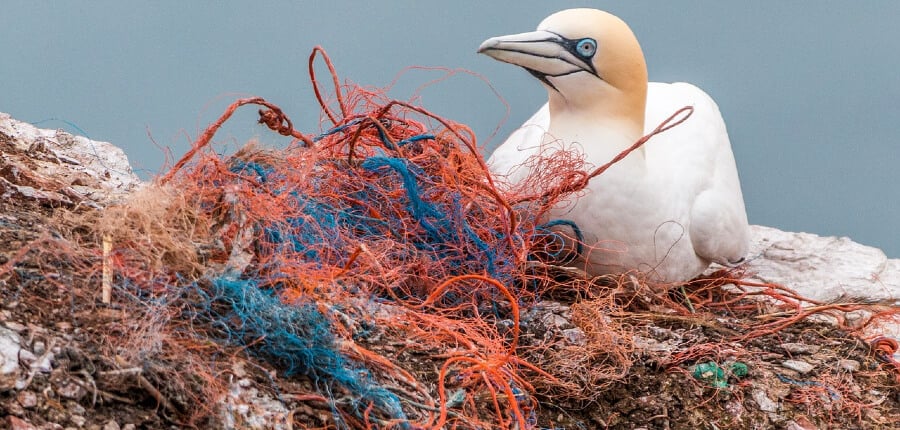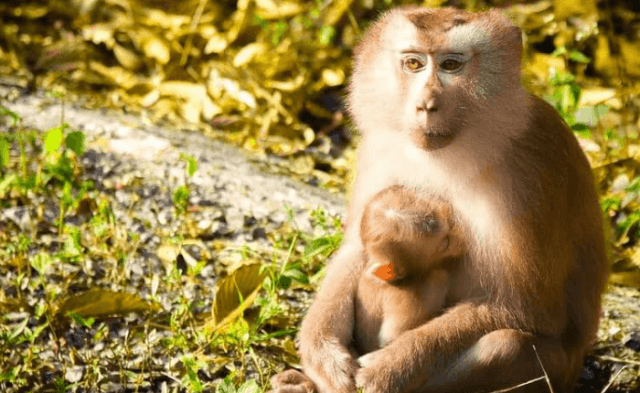By now, you’ve probably seen that viral video of a rescue team pulling a plastic straw out of a sea turtle’s nostril. It’s the video that launched a thousand plastic straw bans.
PETA’s offices are free of single-use plastics, and the organization applauds banning straws and other plastic items that wreak havoc and kill marine animals. But while such bans are an important step in the right direction, a far bigger issue needs to be on the table: Much of the oceans’ plastic pollution comes from nets and other abandoned fishing gear.
Choke on This
Some 640,000 tons of fishing “ghost gear” enters the world’s oceans every year – and can mutilate and kill marine animals for decades afterward. Scientists have warned that within 30 years, there will be more plastic than fish in the sea.
There’s an easy way to tackle the problem: Step away from the seafood buffet and vocally oppose “recreational” fishing, fish markets, and even aquafarms, in which fish are severely crowded, covered with lice, and given no choice but to swim amid their own waste.
Nope, Not ‘Too Many Fish in the Sea’
Although The Marvelettes sang “Too Many Fish in the Sea,” it just ain’t so. According to the United Nations, nearly 80% of the world’s fish populations for which data are available are fully exploited, overexploited, or depleted. Add to that the effects of the climate catastrophe (warming waters have already triggered population losses as high as 35%), and the situation looks bleak.
Just as hunting on land has decimated (or rendered extinct) many animal populations, hunting in the sea to catch and sell fish is doing the same underwater. Numbers of Pacific bluefin tuna have declined more than 96% since the advent of commercial fishing, while marlin, swordfish, and other large fish populations are down 90%.
Turtles in the Trash, Dolphins in the Dump
Fish aren’t the only ones who suffer. Every single year, about 40% of the world’s unintentional catch – some 38 million tons – is dragged out of the sea. Mutilated, dying, or dead, these “nontarget” animals, known as “bycatch” (meaning, caught by accident), are simply thrown away.
They include 300,000 whales and dolphins, 250,000 loggerhead and leatherback turtles, and 300,000 seabirds. In France alone, up to 10,000 dolphins are killed in fishing nets annually.
Although operating on a smaller scale, recreational anglers don’t get a pass, either. Wildlife rehabilitators report to PETA that discarded fishing line and other tackle is the greatest threat to aquatic animals today.
Toxins in Fish Can Cause Brain Damage in Babies
Perhaps the biggest scam is the message that fish flesh is a health food. Salmon flesh is 40% fat, and there are 9 calories in every gram of fat (including from fish), while a gram of protein or carbohydrate from beans, potatoes, or bread contains only 4 calories.
Fish flesh can also accumulate levels of carcinogenic chemical residues, such as PCBs, that are thousands of times higher than they are in the surrounding water as well as extreme levels of mercury, which has been linked to cardiovascular disease, fetal brain damage, blindness, deafness, and problems with motor skills and attention span.
More food for thought: Omega-3 supplements, which are typically derived from fish oil, don’t keep our brains healthy or improve heart health. They may, however, increase men’s risk of developing prostate cancer. Omega-3 fatty acids are best obtained from plant foods, such as walnuts and flaxseeds.
But most important of all, fish flesh belongs to fish, and they suffer when someone decides to kill them for it.
Take Action Now
Eat vegan sushi! It’s delicious prepared with avocados, cucumbers, radishes, and Ocean Hugger Foods tomatoes, which are seasoned to taste like raw tuna – or try Gardein Fishless Filets, Good Catch Fish-Free Tuna, and Plant Based Foods’ Cavi-art. Find more fish-friendly products and recipes at PETA.org/Recipes.





